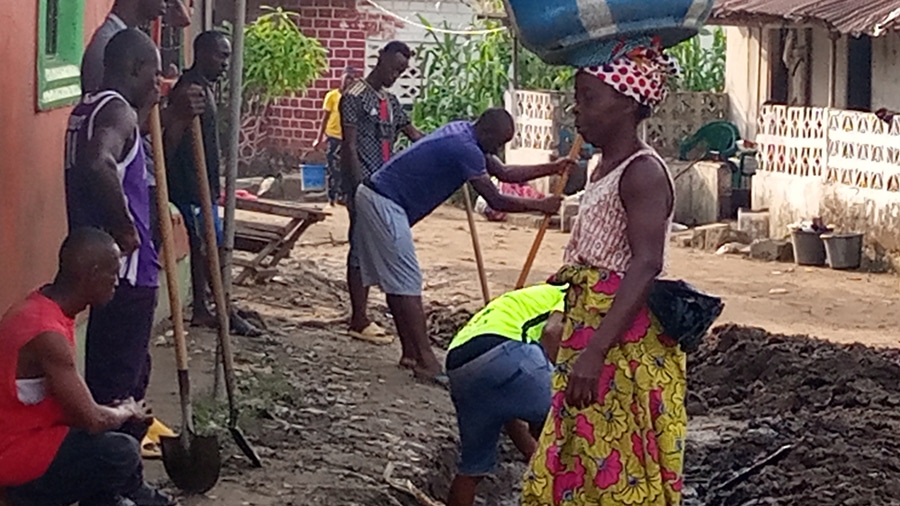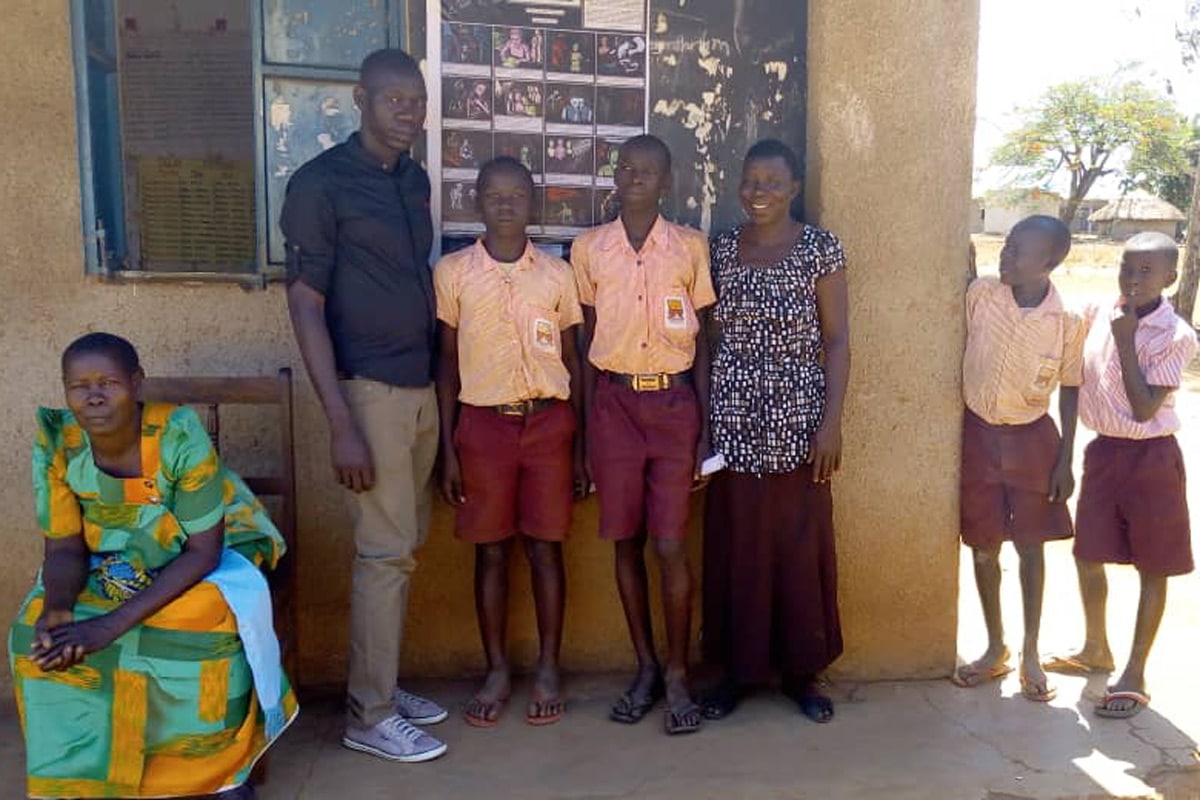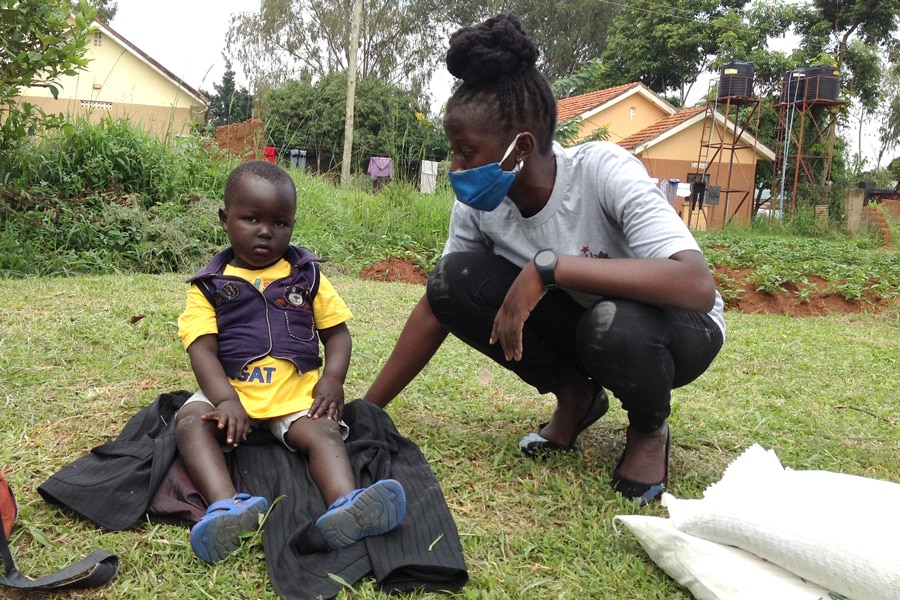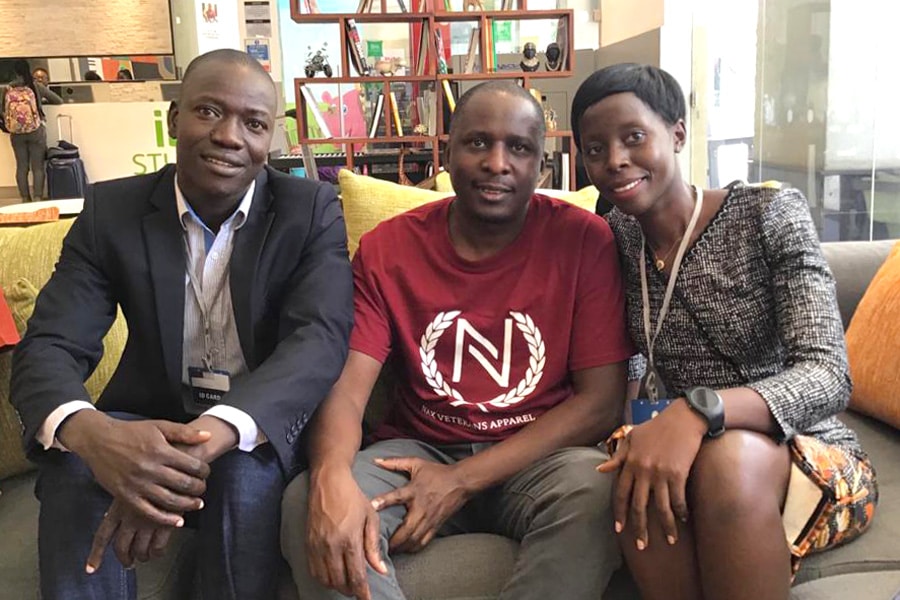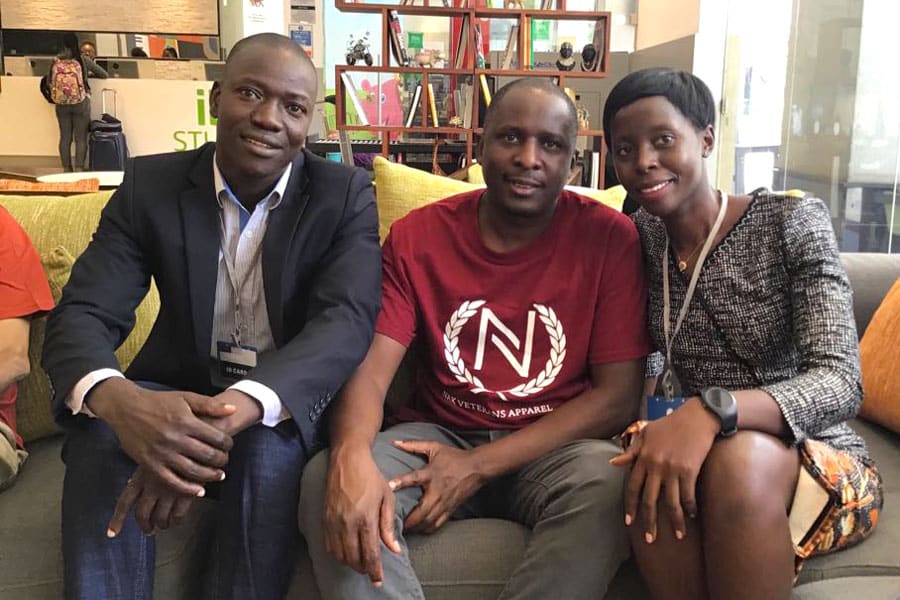African women are brave, and there cannot be just one day to celebrate them
By Diana Alaroker, Global Fellow from Uganda
In Northern Uganda, where I grew up, educating a young girl like myself was not a priority. My culture is patrilineal, so my worth would have been negligible in many other families. Indeed, the dropout rate for girls in my region is 78% for primary school. Girls are a currency of exchange, many of us groomed to be housewives from the age of ten. And at the age of seventeen, we are considered ready for marriage. As early as 5am, while it is still dark, very quiet and cold outside, the day has begun for an African woman. Her tasks are largely domestic, including housekeeping, child rearing, fetching water, cooking and tending to the community’s needs. Women in Uganda work two thirds of the total labour hours and produce 70 percent of the nation’s food, yet earn only 10 percent of its income and own less than one percent of its property.
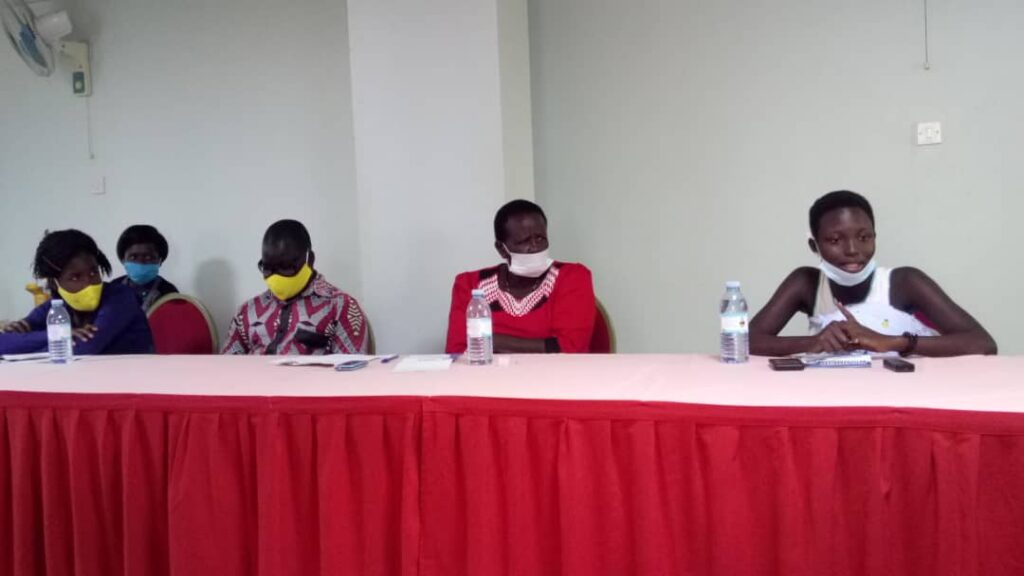
Many African women awake to responsibilities which are overwhelming and challenging at times, responsibilities they have to face as and when they come. The countless sacrifices that they make just to see their children and spouses happy can never be paid back; they are priceless.
Polygamy, which is a norm in the Acholi culture, makes the situation worse, which exacerbated after the conflict in Northern Uganda. Men often elope with other women with whom they feel they are “better off,” leaving their wives with the responsibility of raising the children and providing for the family. For the woman who has been deserted, playing the role of both parents in the lives of their children is quite challenging and hectic.
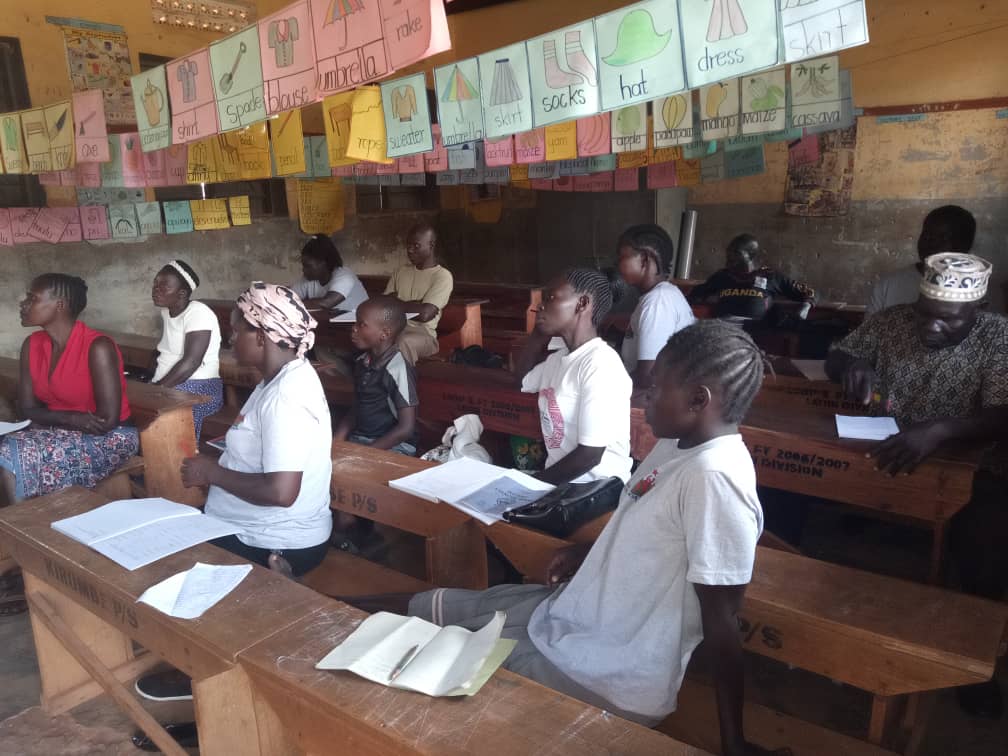
With little or no education, they are unable to get employment in any formal sector, so most of them opt for small businesses, which usually generate little profit, but give them time to attend to their responsibilities at home. And with these small profits, they are able to send their children to school to attain education which they themselves were unable to get.
African women are brave, and there cannot be just one day to celebrate them. Every day should be a day where we respect the dignity of women.
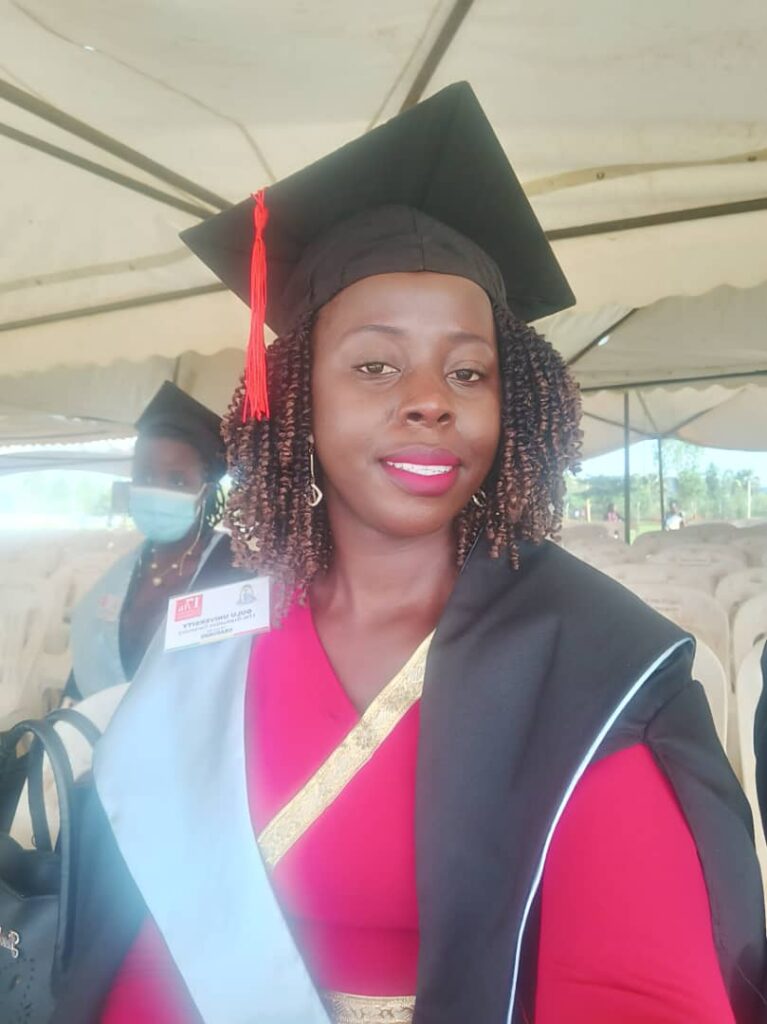
A Look Back on 2022: a year of growth and strengthened solidarity around the globe
By Jassi K. Sandhar, Global Research Fellow
As we wind down the end of another year, I am amazed at how much we have achieved within our network and the strides we have made, both as individuals and as a collective. Our global network and partners continue to accelerate their efforts to attend to the most urgent and pressing needs of their communities. We witnessed increased levels of solidarity, more calls for positive action, strengthened collaborations and shared leadership. We end this year with 150 alumni (representing 40 countries) who have graduated from our Fellows Program and are now part of our wider network.
We have compiled a month-by-month timeline of the achievements of our grassroots leaders below. Despite some challenging times, our network continue to respond with compassion, empathy, and commitment to social justice. We end the year by thanking our dedicated supporters whose commitment made many of this year’s successes possible. We look forward to your continued support for community-driven social change in 2023!
January
We commemorated the 12th anniversary of the Haiti earthquake (which had a devastating and lasting impact on the country), by sharing an update on the current situation and launching our “Global Solidarity with Haiti campaign” to support our partners Daniel Tillias and Malya Villard-Appolon, who are on the frontlines responding to those most in need.
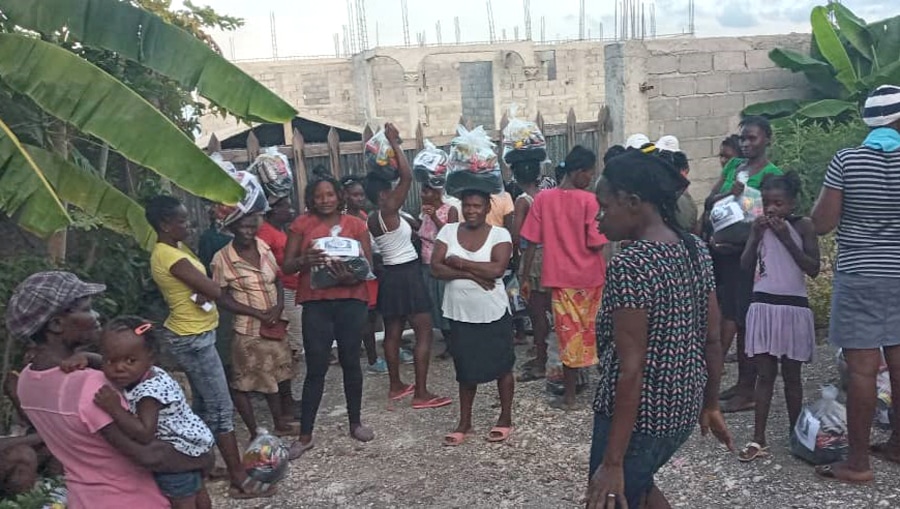
Our alumni in Liberia, Jennifer Henshaw, and her organization LEGAL which works to support the LGBT communities in the country, celebrated their 10th anniversary. Jennifer provides a reflection on their 10-year journey, including their long-standing achievements and ongoing challenges.
January was also a month of collaboration between our global partners. Our partners in the Philippines, Andy Alegre and Susana Salvador-Anayatin, joined forces to deliver urgent humanitarian relief to families following Typhoon Odette in the Philippines. Our 2021 Global Fellows Mathias Ngong Njoya (from Cameroon) and Gopal Iyer (from the UK) also collaborated to host a two-day workshop which brought together 30 youth from 15 countries in Africa and Asia. The workshop was designed to help and guide youth on professional development planning.
February
This month, our 2021 Global Fellows provided an update on their collective campaign; 24 grassroots leaders created a joint fundraising campaign to raise money to support their continued social change projects in their countries. Collectively they raised $12,000. John Kamma, 2021 Global Fellow from Liberia, used those funds to initiate a community clean-up day in Glass Factory community (which is an overpopulated but underserved community).
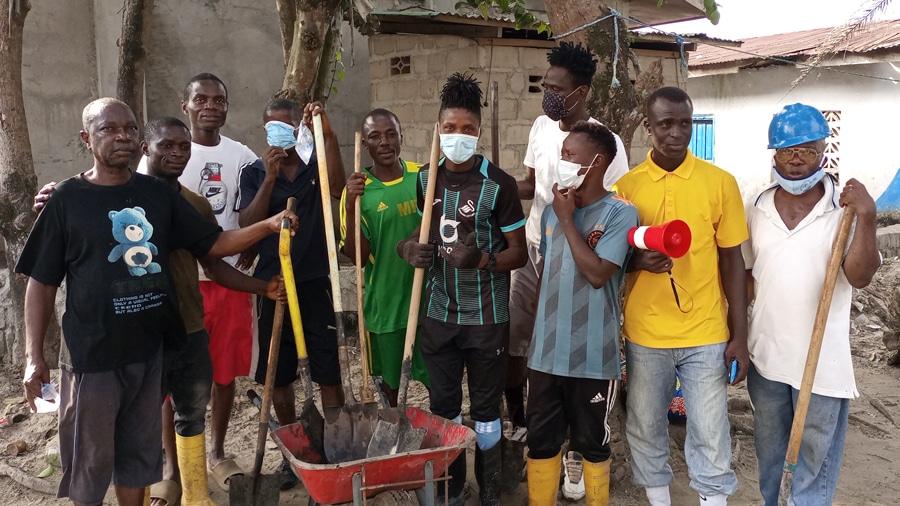
This month, the Chicago Peace Fellows Mutual Aid Collaborative also held a press conference on the anniversary of the assassination of Malcolm X to amplify the themes of their open letter, A Pathway to Anti-Racist Philanthropy.
2021 Global Fellow from The Philippines, Andy Alegre, commemorated International Day of Prayer and Awareness Against Human Trafficking by organizing an online prayer session together with churches and various organizations using a special vigil of prayer specific to this event. This month, Chicago Peace Fellow Jamila Trimuel’s organization also hosted their annual LOV Day, a day dedicated to “show love to our Black girls!”.
March
We welcomed our 2022 Chicago Peace Fellows! 14 grassroots leaders representing 14 different communities across Chicago joined the Fellows program to learn, share, and collaborate together as a Community of Practice.
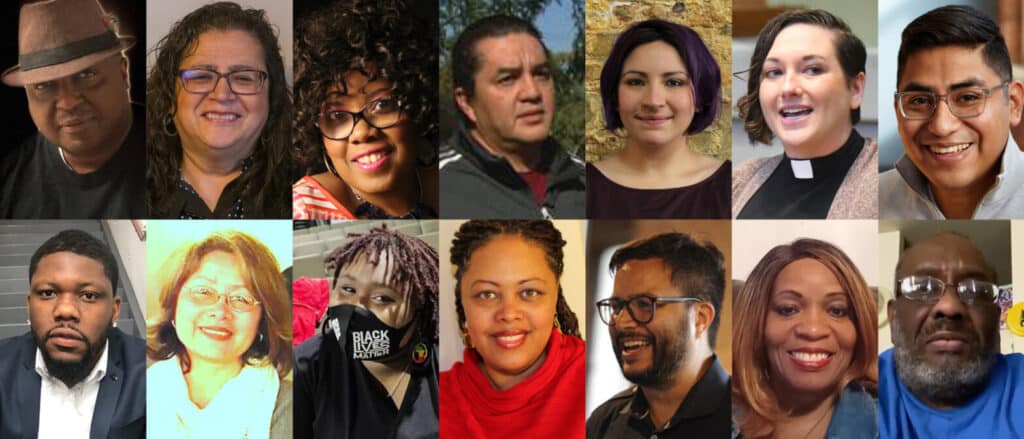
Our 2021 graduates of the Chicago Peace Fellows Program also organized and enjoyed a retreat, to collaboratively focus on rest, restoration and reflection in beautiful surroundings and to strengthen the bonds between them.
We also saw collaborations between DePaul University (Chicago) and Global Fellow Berry Behr (South Africa) which helped document oral history testimonies to capture the interfaith efforts from leaders on the front lines of ending apartheid.
April
Goldin Global Fellow Munyaradzi Dzimunwe from Zimbabwe partnered with She Trades to provide training for women entrepreneurs in the country to help them sell their products on international markets.
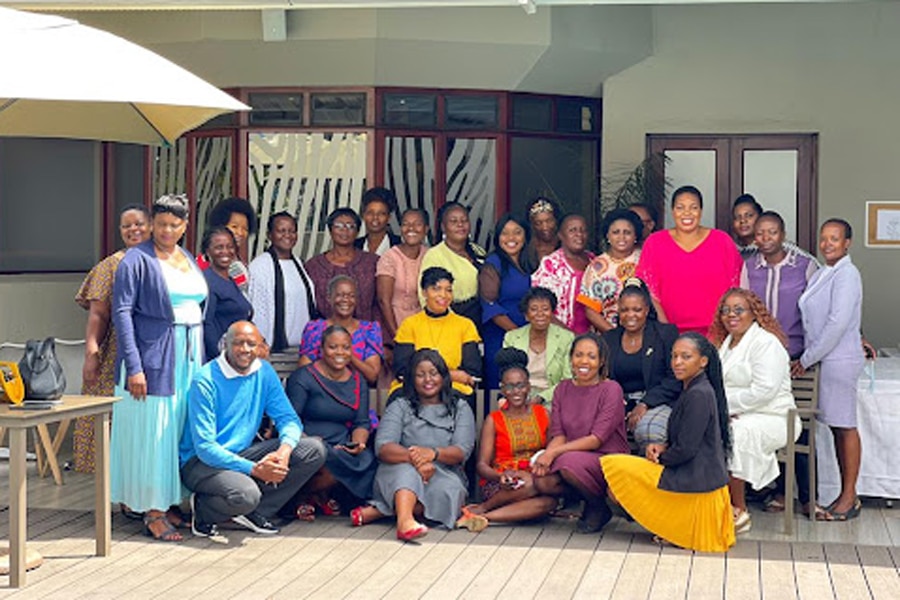
Goldin Global Fellow Nicholas Songora Odoll also provided an update on the critical work of the Manyatta Youth Entertainment (MAYE) in the coastal counties of Kenya to promote social accountability, civic education, and social justice using creative arts. Chicago Peace Fellow, Annette Kelly, also helped host a series of workshops on Violence Prevention in Chicago through her work with the Chicagoland Vaccine Partnership (CVP) in the communities hardest hit by COVID and violence.
The 2022 Chicago Peace Fellows also met for the first time to begin their Fellows Program; the launch brought together a powerful community of activists, artists, social workers, and community leaders representing 14 community areas on the South and West sides of Chicago.
May
Chicago Peace Fellows provided 300 Mother's Day bouquets to mothers who have lost their children to violence in Chicago, bringing comfort to families impacted by gun violence and raising support for peace building projects in Chicago to prevent these tragedies in the future.
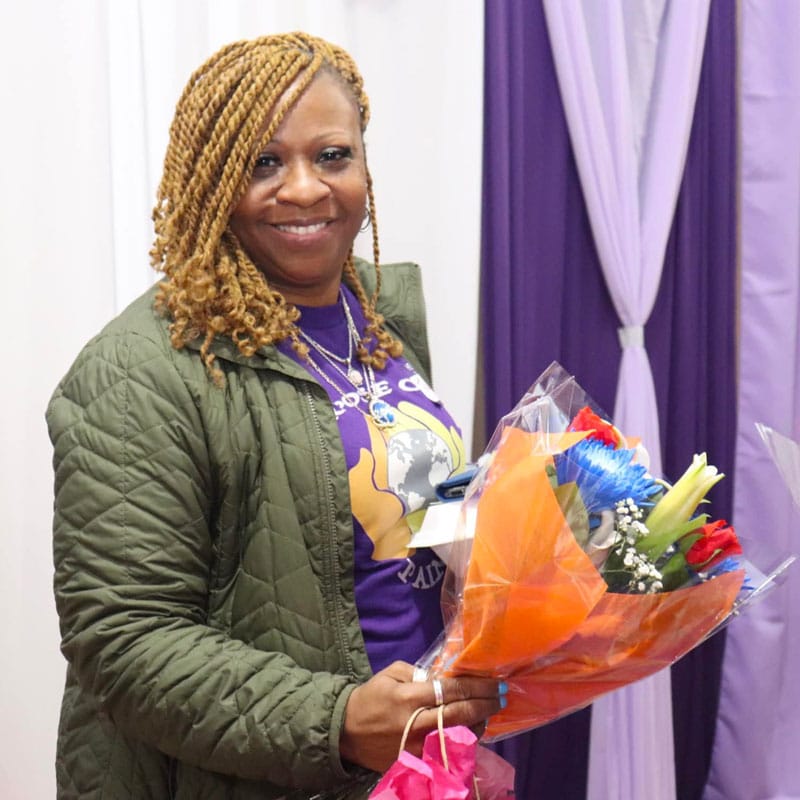
2018 Goldin Global Fellow Cynthia Luvlee shares an inspiring update from Shyne San Diego, sharing the principles that powered the exponential growth of the Shyne Survivor Business Network™ which recently enrolled its 50th survivor entrepreneur!
We also received an update from Global Fellow from Liberia, John Kamma, who worked in collaboration with Catalyst 2030 and his team to mobilize his community to improve health and sanitation and hosted a conversation on narrowing the "justice gap" in the Glass Factory neighborhood.
Mahdar Tahir, Goldin Global Fellow from Malaysia and founder of the Crescent Collective, shared his insights as a panellist for a discussion on religious freedom for which he spoke about the role of religious leaders in building social harmony.
June
In June we welcomed 14 grassroots leaders from around the world onto our 2022 Global Fellows Program! This is the third cohort embarking on the four-month program, where Fellows worked and learnt together as a Community of Practice.

The Chicago Peace Fellows Mutual Aid Collaborative held the Second Annual Concert for Peace at the Hatchery on June 4th, celebrating the artistic accomplishments of their communities and a shared commitment to improving their neighborhoods. The Mutual Aid Collaborative also worked to address an increased demand for blood from Black and Brown donors through holding the #OurBloodMatters blood drive as part of the ongoing project called The Safety Net.
Chicago Peace Fellows hosted a conversation at the Firehouse Community Arts Center on June 3 2022 to discuss community safety and crime data with the University of Chicago Crime Lab as part of the Mutual Aid Collaborative’s Civic Leaders series. This month, Chicago Peace Fellow Pilar Audain also partnered with theater company Collaboration to design and host Moonset Sunrise, a theatrical experience rooted in healing, self-care and collective growth through song, storytelling, dance and ritual.
To solidify and spread the benefits of the peace agreement in the Southern Philippines, Global Fellow Lo Ivan promotes the need to lean into the indigenous culture of volunteerism, known locally as "bayanihan", as a peace multiplier that shapes the Bangsamoro youth as proactive agents of peace, development, and social transformation.
July
In July we launched our first ever Global Fellows Program in Spanish! We welcomed 17 grassroots leaders and activists onto the program, who undertook the curriculum and engaged in the journey together in Spanish. These Fellows live and work in Argentina, Bolivia, Chile, Colombia, Haiti, Mexico, Spain, the United States and Venezuela.
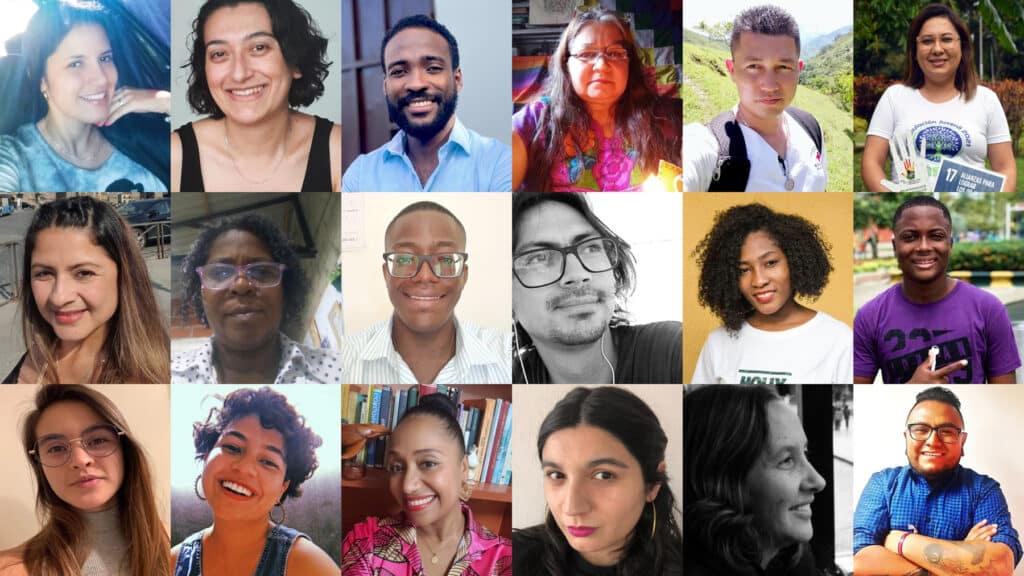
Chicago Peace Fellows Mutual Aid Collaborative hosted a Civic Partner Series conversation with University of Chicago Medicine Violence Recovery Team to learn about a unique public health model of violence interruption. And Global Fellow from Detroit, David Metler, provides insights into Swingset Activism and the idea of social justice education inspired by childhood. He proposes that we have much to learn from children who can help us integrate our activism into our lives and embrace the elements of playfulness, joyfulness, loving-kindness, presence, creativity, and our capacity to re-imagine what is possible.
August
The Chicago Peace Fellows Mutual Aid Collaborative this month carried out two activities. They launched the Safety + Cycling Team to tackle violence which occurs during road and traffic accidents, by providing bike helmets and safety tips at community events.
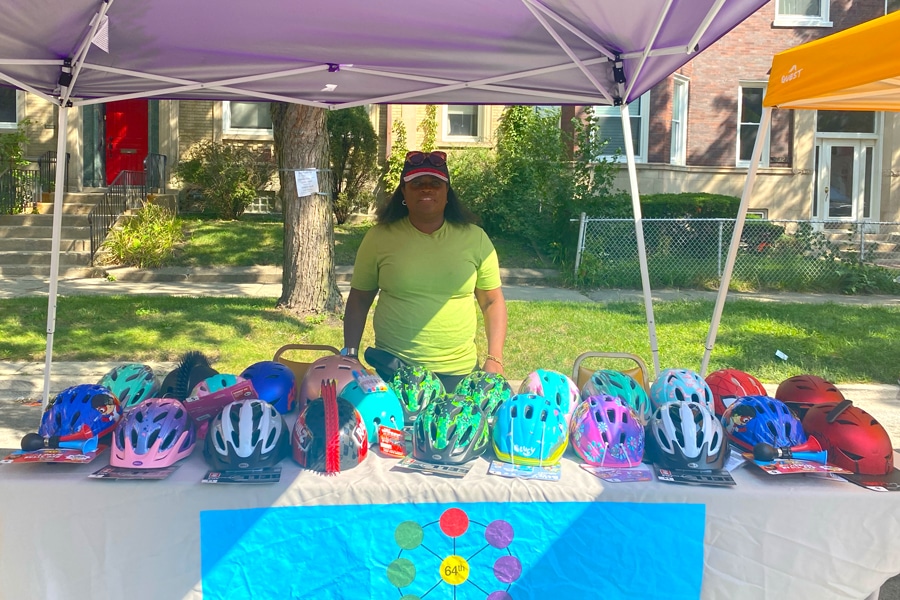
The Mutual Aid Collaborative also hosted a conversation with Dr. Andrew Papachristos to build connections and learn how the science of social networks can be used to understand and target support to people at the highest risk of becoming a victim of gun violence.
2019 Chicago Peace Fellow, Pastor Robert Biekman, piloted a Community of Practice utilizing the GATHER Platform to foster peer-to-peer learning amongst newly ordained pastors with the Evangelical Lutheran Church of America (ELCA). And Global Fellow from Argentina Diana Rocio Gomez Torres, explored the emergence of social movements across South America and bring visibility to the history and memory of these strategies of practical and symbolic resistance.
September
In September, our Fellows around the world embarked on several peacebuilding projects in honor of International Day of Peace 2022. These activities included: The launch of an apprenticeship program for Children Born of War in Uganda, using soccer to promote peace and reconciliation in Colombia, creating a new generation of youth leaders working on peacebuilding in Israel, Freestyling for social change in Colombia, and Peace Day activities from three Global Fellows in South America.
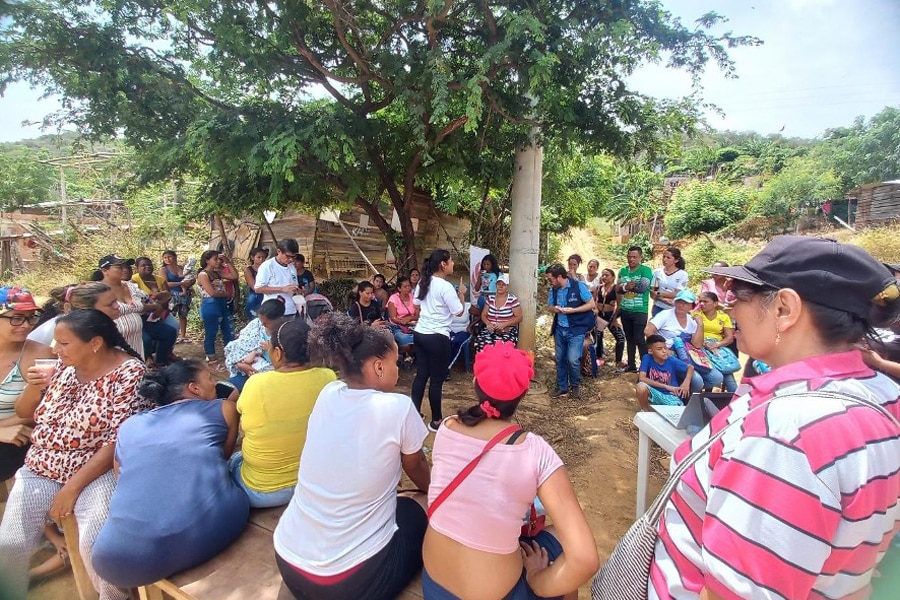
This month we also saw the graduation of the 2022 Chicago Peace Fellows! After embarking on a five-month learning and sharing journey together, their achievements were celebrated at the Chicago History Museum.
October
This month the Goldin Institute turned 20! For the past two decades the Goldin Institute has adopted an approach which is grassroots-led and embedded in kindness, compassion and learning, from everyone but most especially those closest to the issues. We promote the voices of those excluded voices who often have the most at stake in making progress and ensure that they have leadership roles in every social change movement. Which is why it is extremely exciting to celebrate 20 years of the Goldin Institute.
The Chicago Peace Fellows Mutual Aid Collaborative also launched Generation NOW, an idea conceived by Messiah Equiano, a 2021 Chicago Peace Fellow, which will provide opportunities for young people to write and produce a teen talk show addressing everyday issues that teenagers face. We also celebrated the Chicago Day of the Girl with Chicago Peace Fellow La’Keisha Gray-Sewell’s organization (Girls Like Me, Inc) hosting an event to both celebrate Black girls in the city and ensure their sense of belonging.
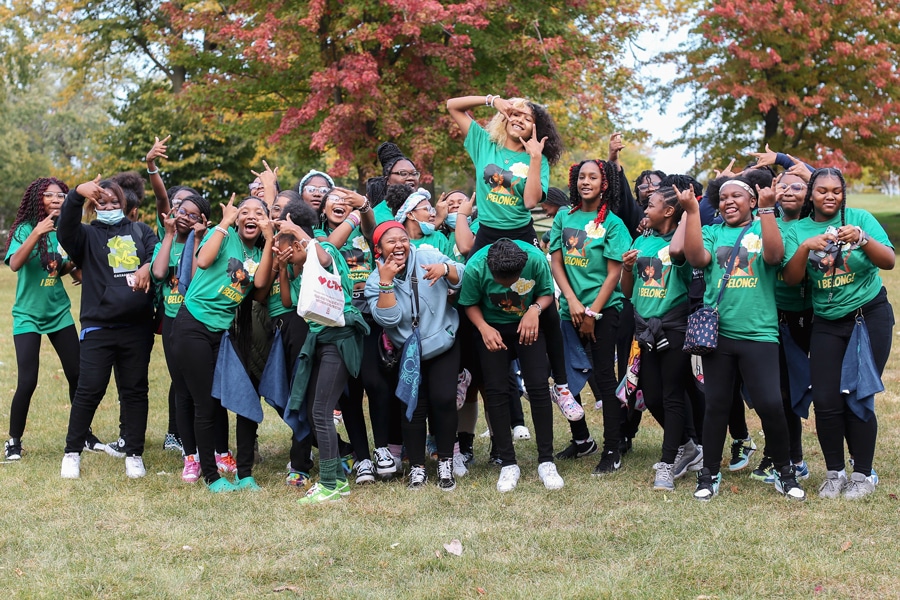
The first annual Sukkah Design Festival was also held this month, on October 9-16, showcasing North Lawndale’s Jewish history and providing social services to the community. Reshorna Fitzpatrick, 2019 Chicago Peace Fellow and Executive Pastor of the Stone Temple Baptist Church, was a member of the organizing committee, which included both community-based organizations and design firms.
November
Our 2022 Global Fellows (English-language cohort) graduated from the Gather program! At the graduation ceremony on 4th November, the 2022 Fellows demonstrated their achievements and shared their aspirations, recognizing how much stronger they now are together.
Global Fellow Oluchi Uzodimma from Nigeria also provided an update on the devastating impact of the recent flooding in Nigeria which has displaced more than 2 million people and damaged over 200,000 homes.
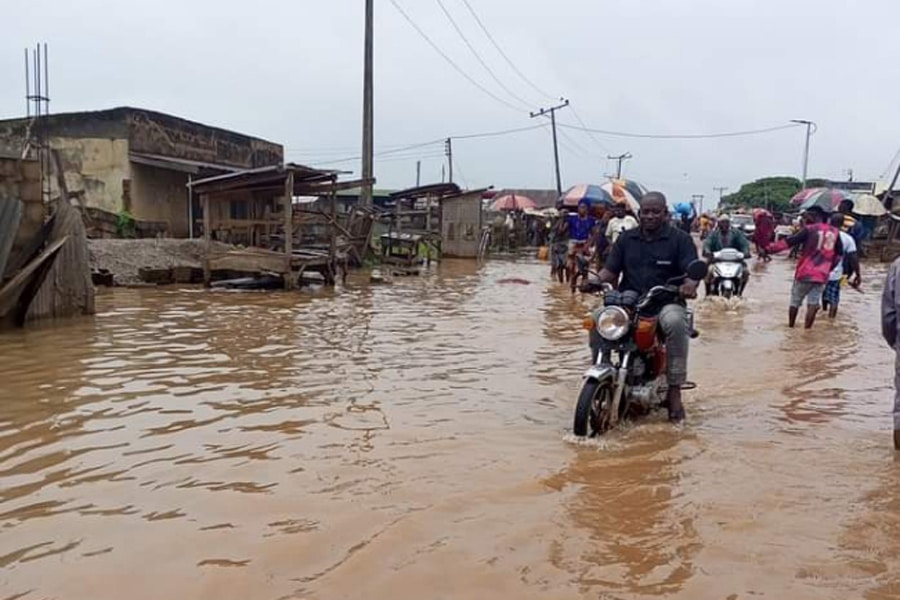
December
As we wind down to conclude the year, we were honoured to celebrate the achievements of the first Spanish-speaking cohort at their graduation ceremony on December 10th. The ceremony included performances in the form of song, freestyling, music, and poetry and reflected on what the Fellows had achieved, individually and collectively.
We remain humbled and honoured by the achievements of our global network of Fellows and we have much to be thankful for, especially the support of our global network of friends and colleagues. We would like to give a special thanks to all our sponsors and supporters for ensuring our leaders were able to continue their much-needed activities throughout the year.
YOLRED Begins Apprenticeship Program for Children Born of War
By Geoffrey Omony, 2018 Goldin Global Fellow, Uganda
We are delighted to announce the launch of YOLRED’s new apprentice program for Children Born of War (CBOW). In the Northern Ugandan context, CBOW refers to children who were born during captivity to combatants under the Lord’s Resistance Army. The war ended over a decade ago, but there are now approximately 6,000-8,000 CBOW living in Northern Uganda, many in Gulu district (where YOLRED is based). YOLRED have carried out extensive activities with the war-affected community, and we have found that what is most required for children born of war is economic empowerment and support. There are organisations conducting research projects and doing advocacy work, like ours, to try and reduce stigma against CBOW on a mass scale, but what is really lacking for CBOW is adequate livelihood opportunities. Even within organisations which try to tackle discrimination against CBOW there is a lack of job opportunities for them.

For this reason, YOLRED began thinking about a new initiative specifically designed to address this gap and to offer a form of economic empowerment which was not being attended to elsewhere, and thus in February 2022, we began this apprenticeship. YOLRED was provided with financial assistance to pilot the apprenticeship program for 6 months, to test the model and assess how it could work in practice. This donation funded the pilot program from February – July 2022; recognizing the importance of this apprenticeship and what it promotes, we have been awarded a grant from the CBOW project to fund this program for an additional year.
“The importance of this apprenticeship and what it promotes has been recognized by the CBOW Project; we are delighted to announce that we have been awarded a grant from them to continue this program for an additional year.”
This project was born out of an identified need amongst war-affected youth and is focused on children born of war (who are a category of marginalized youth in Northern Uganda), with greater attention paid to girls who face greater burdens. This program has been initiated to provide a career pathway for these marginalised young people as well as on-the-job training, and ultimately economic and social empowerment. Economic empowerment is the best way to support those most impacted by the conflict, and something we at YOLRED believe is essential to the continuation of a peaceful existence in the region.

The current apprentice, who is a young woman, has been employed with YOLRED since February 2022; her parents are categorized as the formerly abducted, and she was born in captivity. Her parents managed to escape the conflict when she was a young girl, but nonetheless she found reintegration a challenge due to environment she returned to, which stigmatizes CBOW. Of this opportunity, she states the following:
“Being an apprentice at YOLRED is a tremendous and miraculous thing that has ever happened to me. It has empowered me to be able to support myself and my close associates. Many people think that children born of war cannot do anything productive in life as a result of the traumatic experiences we incurred. This job will allow me to prove them wrong because I am able to challenge their negative perceptions about children born in captivity and show the positive ways in which we can work and interact with others, reducing the level of stigma on me and other children born of war. With my experience as an apprentice in mind, I feel any apprenticeship opportunity will be a great help to my brothers and sisters who were also Born of War.”
Having run this program for six months we have recognized its extreme value and importance not just the individual apprentice but for the wider CBOW community in Northern Uganda. Positions like this help to combat stigma against CBOW, especially for girls and women, but can also encourage other organisations and companies to follow suit and offer similar programs.

Extensive research has been done in Northern Uganda to assess the impact of the protracted conflict (which took place from 1987-2006) on children, including children abducted to serve in the Lord’s Resistance Army and children who were born in captivity. Many ex-child soldiers and CBOW who have returned still do not consider themselves free; they remain confined due to post-conflict struggles and excessive stigma and exclusion. As an organization which supports peace in the region, we are particularly focused on providing economic opportunities to those who face stigma or marginalization as a result of the conflict. There is also a lot of intergenerational trauma for children born in captivity who, if their background becomes known, are often labelled the dehumanising terms ‘rebel children’. These children experience a lot of social exclusion and bullying (which can lead to school-dropouts or desire to move to other cities), as they are often not accepted by extended family members and peers. Which is why this apprenticeship program is so valuable and important.

YOLRED adopt a ‘nothing about us without us’ policy and our initiatives are informed by local impact agendas. Our efforts are rooted in the region and led by Acholi people, rather than an approach which is imposed on us, and we centre survivors-needs in all of our programs.
YOLRED Provides Critical Supplies to Families Struggling to Survive COVID-19

When the COVID-19 pandemic hit Uganda in late March, most people who live from hand-to-mouth, saw their lives crumble as their businesses were closed and sources of livelihoods shut. According to the Youth Leaders for Restoration and Development (YOLRED) Program Director, Geoffrey Omony, a survey done by the organization early this July, and targeted at assessing the impacts of the pandemic on the Lord’s Resistance Army (LRA) survivors, revealed that many families were sleeping on empty tummies because they did not have food.

“Life has been really tough because the lockdown was sudden and the little food we had in the house could not sustain us for long,” Lilly Atong, one of the YOLRED's beneficiaries said in an interview, “The lockdown found me with ten children in the house yet I had no way to get money or food. The beads I made were not selling because my customers who are majorly foreigners coming to visit the country were no longer coming.”
Atong said even when she had just newly acquired additional skills in modern catering, she could neither establish a business because she did not have the capital, nor find employment since hotels were closed.

The Government of Uganda announced a lockdown in the country on March 23 where public transport, non-food businesses, places of worship and all forms of public gatherings were banned. A few days later, even private cars were banned from the roads and motorcycle riders were instructed to carry only luggage and no passengers as people were being encouraged to stay at home in a bid to curb the spread of the noble coronavirus disease.

To Jennifer Acan, a single mother of five, living with a disability following the amputation of her left leg, the sudden lockdown coupled with her disability, was disastrous.
We would go on empty stomach for several consecutive days, Acan said, Sometimes I would send the children to look for some wild plants so that we could boil and take.
But following the survey, YOLRED on Thursday, July 30, distributed emergency relief food, sanitary and educational materials worth over eight million Uganda shillings (about US$2,200) to at least one hundred of such starving families. The items included; 15 kilograms of maize flour, 10 kilograms of beans, packets of salt, two bars of soap, two pieces of cloth face masks and self-learning materials for their children.

“I am so glad that YOLRED thought of doing this for us,” Acan said, “At least I am sure that today I am going to eat and get satisfied. I thank YOLRED so much for standing with us. They are supporting our children in school and now doing for us this; we cannot thank them enough.”
To Kenneth Oyet, the food relief was a huge save from embarrassment, especially of a father being unable to feed his family.

“I watched with deep pain and embarrassment whenever my children would cry of hunger,” Oyet said, “Taking home these items will make me a man and father again. I would like to thank YOLRED and the people sponsoring it so much for caring about us.”
The food distribution was conducted at the YOLRED headquarters in Gulu, and witnessed by representatives from the Gulu District COVID-19 taskforce.
While addressing the beneficiaries, Felix Olanya, who led the two-man team from the taskforce, appreciated YOLRED for joining the Government of Uganda in supporting vulnerable groups within Uganda. He said, while the Government would have wished to serve everyone, its capacity was limited that was why groups like the LRA survivors did not get food relief.

Mr. Omony, said that, while they found overwhelming need from the general community, he was happy that YOLRED was able to provide those items to their beneficiaries.
As of July 30, Uganda had registered at least 1, 147 cases of COVID-19 infections and two deaths. But there is fear for a speedy spike in the number of cases and deaths as private and public transport return to the roads, businesses get opened and more people travel across the country.
In a special way, YOLRED and team would want to thank the team Goldin Institute and Carlotta Ludovica Passerini for supporting the LRA former child soldiers with life necessities and sanitary during this difficult time. Your support has been a lifesaving to our beneficiaries.
Prevention, Reintegration, and Healing of ex-Child Combatants in Northern Uganda

Early this year, I and Diana attended a two days’ workshop in Nairobi organize by the Antislavery Knowledge Network (AKN) with the aim to contribute to a critical conversation on modern slavery and the value of methods from the arts and humanities in addressing it.

In 2018, YOLRED had been awarded a one year large grant from AKN worth £40,430 for its art based project titled Bila Pi Kuc: Creative Art-based Therapies for the Prevention, Reintegration, and Healing of ex-Child Combatants in Northern Uganda. Additionally, the safeguarding project which also aim at promoting a process of dialogue on concrete practical measures that each of us in our different roles can take, individually and collectively, to promote good safeguarding practice at every stage of the international development research process was as well funded by the AKN.
Therefore, the workshop gave YOLRED the opportunity to share with its partners the progress and outputs of these two projects respectively.

Bila Pi Kuc had three major outputs:
- A community cultural festival which brought together over 500 people for a day of creative arts-based performances, with the aim of facilitating dialogue on several issues related to child-soldiery that were not addressed during post-conflict peacebuilding and remain overlooked even today.
- A graphic novel which amalgamated stories collected from in-depth interviews and oral histories with 25 former child soldiers to form one narrative. The graphic novel is available at: https://goldininstitute.org/graphicnovel.
- An animated film presenting the journey of former child soldiers, using the voices of the research participants as the narration.

The Graphic Novel, We are Not Free, has been widely distributed locally including over 50 schools, religious institutions and cultural centers. Through our partners in the UK, the novel has been shared through the University of Bristol website where is has been one of the top most viewd pages for the University (where the average time spent on the page is over 5 minutes). Our colleague Jassi shared the graphic novel in an interview on BBC Bristol and has been used by international organizations like War Child UK, Child Soldiers International and at a number of Universities across the country.
Globally, the Graphic Novel has been shared widely as well:
- Displayed at the UNFPA’s high-level Nairobi summit (ICPD25) in November 2019, which was attended by over 8000 delegates;
- Presented at the ISSOP’s annual meeting on Children in Armed Conflict in Beirut in September 2019;
- Shared with: universities in Europe, NGOs, policy offices;
- UN Children in Armed Conflict Unit
- New Humanitarian
- Child Soldiers Initiative (Canada)
- Justice Hub
- UN Security working group for children in Democratic Republic of Congo
Thanks to the success of this initiative, we have witnessed change or success in three primary areas:
- Confidence and Esteem: we have seen the beneficiaries involved in this project see themselves in the outputs and feel valued and their voices expressed
- Global Reach: More engagement with researchers internationally who have seen the comic and have reached out to Jassi or me about how to write about child soldiers in an ethical and positive way
- Community Cohesion: the cultural festival has brought together former combatants and non-combatants in a positive and non-judgemental space
On the other hand, the safeguarding project was created to address some of the issues around safeguarding and research practices in the region, so the safeguarding challenges and barriers were not necessarily specific to the project but instead relevant to the work YOLRED does.
The challenges to the safeguarding of former child soldiers and YOLRED staff (and to some extent the wider Northern Ugandan community) which were exposed during the focus groups included:
- Negligence in the way we conduct research and not considering local cultural and social values, for example international researchers dressing inappropriately, and asking questions which revolve around taboo subjects, such as sexual intimacy and killing. Most research agendas are driven by the researchers or the funders, with little importance given to the research desires of people in the region. Moreover, much research does not show the actual representation on ground, as researchers choose to interpret the data in a way which suits their agenda or research objectives.
- Exploitative and extractive nature of research, which takes from participants without providing any benefits in return. Most former child soldiers would agree that they are the ones benefiting the researchers, as their stories are providing the researchers with careers and salaries. Moreover, the lack of compensation for people’s time, including YOLRED’s and other NGOs involved in research projects, fails to address the neo-coloniality of research projects such as the ones active in international development research. Language for direct communication between researcher and the former child soldiers has always been a challenge too as most former child soldiers do not speak English, and as a result are unable to access the language of the researcher but also their research outputs.Rushed nature of data collection: the time frame and approach of researchers whereby they come for few days and want to get enough information for their research and put a lot of pressure on participants and NGOs they are working with. Due to these time limits, they also do not sometimes vet the people they are working with and sometimes research assistants are not credible (i.e. some people invite their friends or relatives to work as research assistants). They also ignore the component of creating a rapport with the participants and do not interact much with people locally. Doing the interview from the participant’s home gives alertness to the community members about their status of being former child soldiers.
- White Savior Syndrome where people see everything about “white people” as being good and their expectations are always high.

In response to these various concerns, we wanted to document what practices former child soldiers themselves felt were harmful, exploitative, and negatively impacting them within current research practices. We therefore held 3 focus group discussions with 33 former child soldiers and then a stakeholder workshop, to explore what community leaders believed were issues with research practices. And, after carrying out the data collection, we confirmed that they are continuing to suffer from unequal and exploitative research practices, as described above, but even more strongly than we had presumed (for example, we did not realise that most of them believed that YOLRED was financially benefiting from researchers engaging in these projects though them, when the truth is that YOLRED actually is not compensated for their time and only engages with researchers due to feelings of obligation as well as hope that they can bring some change).
Following this, and through working with the community groups and former child soldiers, we were able to update YOLRED’s safeguarding policy with this new information forming an integral part and produce an internal policy for YOLRED. We have used these new protection protocols to educate YOLRED staff about the harms felt by former child soldiers within research processes (as the team were present during the focus group discussions and listened to the concerns of the groups we work with) and engage with a range of stakeholders on safeguarding issues and shared the information we had obtained during the FGDs with our wider network. We are currently producing a report on the findings, with a set of guidelines on how researchers can operate more ethically in the region.
This is part of a collaborative project between YOLRED (Uganda) with Jassi Sandhar (University of Bristol) and the Goldin Institute. This project, titled “Bila Pi Kuc: Creative Art-based Therapies for the Prevention, Reintegration, and Healing of ex-Child Combatants in Northern Uganda”, is generously funded by the Arts and Humanities Research Council through the Anti-Slavery Knowledge Network (as part of the Global Challenges Research Fund).
After the workshop, we were exhilarated to meet our own Global Alumni Geoffrey Waringa and really we had a wonderful conversation with him.

Global Fellows Meet in Kenya
By Geoffrey Waringa, Goldin Global Fellow, Kenya
On Feb 3rd, 4th and 5th, GATHER global alumni from Uganda Miss Diana Alaroker and Geoffrey Omony of Youth Leaders for Restoration and Development (YOLRED), the first organization designed and run by former child soldiers, attended an Anti-Slavery Knowledge Network workshop in Nairobi, Kenya.

During the workshop, they made time to link up with me, GATHER Global alumni from Kenya Mr. Jeff Waringa, and it was a very joyful meet-up for people who have virtually know each other for more than a year but never met physically.

The three of us had very fruitful discussions centered on the possibility of working together on a regional scale. We noted the challenges of real time communication with all GATHER fellows from the East African region due to engagements and access to online communications amongst them. However, we made a commitment to start the conversation and get something going that the rest of the East African fellows could join later.

They made arrangements for a further meeting the next day which was the Ugandans’ day of departing. They made time to meet in between other meetings and on the ride to the airport. On the last day, they visited Goldin institute’s partners Arigatou Kenya offices in Nairobi, where they also had very pleasant discussions with Dr. Dorcas Kiplagat about the YOLRED projects in Uganda. Dorcas and I also had a pleasant meeting, and I updated her on my work in Kenya and the challenges I’m facing in combating the wave of violent extremist radicalization on the Kenyan coast.

The meetings ended well and commitments were made to remain in constant communication towards further collaborations.
GATHER Alumni Focus on Child Soldiers, Mitigating Trauma

On August 6, Global GATHER alumni Lissette Mateus from Colombia, and Diana Alaroker and Geoffrey Omony from Uganda engaged in an online video conversation about child soldiers and war-affected children for their peers among the inaugural Gather Fellow cohort. They were joined by Theresa Betancourt, a Boston College professor who’s been performing a longitudinal, intergenerational study of former child soldiers in Sierra Leone.

The hour-long conversation included reflections and questions from GATHER alumni Jeff Waringa from Kenya, Alexander Gwanwalla from Cameroon, and Emma Rutikanga from Rwanda, who shared their experiential knowledge as well as shared challenges.
Lissette, the co-founder and visionary behind Serendipia, spoke to everyone on the video call about the challenges which she faces supporting de-mobilized female fighters as well as how she helps train communities in the “ESPERE” model for reconciliation and healing. From Gulu in northern Uganda, Diana and Geoffrey highlighted their concerns regarding the stigma which make it difficult for former child soldiers of the LRA (Lord’s Resistance Army) to successfully integrate into civilian life. Employment and housing demands often force young people into homelessness or extreme poverty, but YOLRED is uniquely positioned to address the lives of former child soldiers in northern Uganda as an organization created by ex-combatants such as Geoffrey, who spoke movingly about the impact of his experiences.

Theresa Betancourt directs the Research Program on Children and Adversity at Boston College, having formerly worked for international non-profit organizations such as the International Rescue Committee in places such as Uganda, Bosnia and Sierra Leone. She and her team of students in the college’s School of Social Work are undertaking research projects in countries throughout the world, including several in which GATHER Fellows are the principal organizations. Dr. Betancourt emphasized the need to understand and mitigate intergenerational trauma, especially when conflicts unfold over decades, or post-conflict mental health systems are not developed.
Following the video conversation, several Gather Fellows were connected with Dr. Betancourt ‘s program to continue the conversation and collaboration.
The full video of the webinar can be viewed here:
Solving Tough Issues through Community Parliaments in Uganda

Warm greetings from Uganda!
On Saturday, April 20, Youth Leadership for Restoration and Development (YOLRED) organized a community dialogue, called a ‘Kabake,’ where the community was granted a platform to share their experiences and derive solutions. The dialogue was attended by, among others, local council leaders, the police, child rights activists, business men and women, and the general community.

In the Layibi Division of the Gulu Municipality, there had been an epidemic of rape, robbery and violent attacks, especially on women in Library Parish. The community was engulfed in fear and hopelessness. Women could not walk out of their houses past sun-set if they were to avoid rape and attacks. Those in business had their property and money robbed, even in broad daylight, by a known gang who threatened them with violence or murder. And yet both the police and local leaders could not help the situation.

Mrs. Beatrice Ayat, a member of the local council and secretary for community service and production who represented the division chairperson, said the situation in the area had gotten out of hand because the perpetrators of violent crimes who started as children and would only steal from people had grown up and gained confidence to attack directly.

Ayat said they openly robbed people and raped women, threatening to beat the victims or torch their houses if the crimes were reported.
[quote]“I am so thankful to YOLRED for organizing this dialogue. When we have a problem in our community and we meet and discuss, we can always find a solution,” Ayat said.[/quote]

The officer in charge of Layibi Division police station, Assistant Inspector of Police Wilbert Adekere, said as police, they have been aware of the insecurity in the area but could not take any action because no member of the community was opening up to tell them who the perpetrators were.
Assistant Inspector Adekere consequently invited members of the affected community to secretly walk into his office and tip him on any security problem.

The Honourable Rose Aparo, a member of the local council, said she was going to forward the people’s plight to the council for discussion. She expressed confidence that the council would arrive to a logical conclusion that would save the community.
Mr. Odong Walter (We-yoo), the Community Sensitization Officer, said he was going to meet with the area Local Councilor One and his executives to forge a lasting solution to the problem. Collins Chwa Kisembo, the Counsellor and Monitoring and Evaluation Officer at YOLRED, appreciated the community for attending the meeting in large numbers. T
The former child soldiers also had the opportunity to share their experiences and receive healing in what we called testimonial therapy, which aims to heal the traumas and symptoms of depression, low mood and PTSD within the vulnerable populations.
In addition to sharing news from our recent Community Parliament, we are pleased to provide an exciting update on the project for which we raised funds through Indiegogo: the construction of a community resource center to offer counselling, training and recreational services to the victims. Some days it feels impossible to get this up and running, but we remembered one thing that was also core during our GATHER class that "adaptive challenges require changes in values, beliefs and approaches to work."
To that end, we have set off with a group savings and loan plan with the hope of driving the group towards a self-reliant, participatory development that should be sustainable. "Start with what you have" is the principle we applied for the construction of the community resource center. The Indiegogo funds we raised during GATHER for this project was not enough to acquire the land by itself, but we are building on these donations from around the world with local support.
[quote] We are happy to report that together we were already able to secure a piece of land, where we plan to have a permanent headquarters for YOLRED![/quote]
My sincere thanks for the support the entire team at the Goldin Institute gave us during our GATHER course, especially with the Indiegogo campaign, which made all the above development possible. I will share additional updates as we progress on our services to the community and the development of our headquarters.
Best regards,
Geoffrey
She Will Rise!

Young girls from Northern Uganda were ambitious and had dreams like children born in different parts of the world. They had dreams of becoming great leaders, doctors, pilots and engineers but all these were shattered when they were taken into captivity. They were forced to drop out of school and were made to leave everything behind. This was the beginning of a nightmare, one that still resonates in their wakefulness.

Some were given guns and were told that was all they needed for survival, to be great, to achieve their dreams. They were told the making of dreams needed sacrifices; of watching their siblings killed, friends mutilated, and their homes set ablaze. Escaping was never an option. Escaping was death.
And so, many made a life in captivity. They made friends and enemies and lived in fear of the people who promised them salvation and glory for fighting in a war they would never understand the cause. No one knew exactly what the fight was for; maybe it was God’s calling for the leader who insisted he led the “Lord’s Army.” It could have been for the rulership of a nation that had to start from somewhere and it started from their homes. It could have been both, but one never really knew. They just survived day after day.

They were forced to become wives to commanders randomly assigned and picked and thrown around, divided and shared like they were nothing. They become mothers at ages they needed mothering themselves but they had to love their children and teach them that the life they lived was somehow reality, hoping one day real salvation might come their way and show them a better life.
Most of them came back as child mothers with their children from captivity only to be rejected by their own families, who often looked at them as a burden. Tracing the families of the fathers of their children was almost impossible, and they had to keep suffering even in a better environment.
They have had to toil to get shelter, feed and educate their children. Lacking academic qualifications means being in the low levels of casual labour and not being able to compete with those who had better opportunities and a less gruesome past.

Most of these women, still young, have remarried so as to survive and provide a good life for their children, but some end up in a life of domestic violence and or separation with even a much bigger burden than when they went into these marriages. One of the major reasons is their past and the burden of the children they came with. The question is: What future do these children have?
The dreams of these women are to be economically empowered, independent and having their children educated. We at Youth Leaders for Restoration and Development (YOLRED) have trained some of these young women in financial literacy, that is to say generations of business ideas, how to start and improve a business, group dynamics, and village savings and loan associations (VSLA) to enhance their business and saving skills. We also gave them financial support to help them improve their businesses. In order to enhance the physical, psychological and mental healing of these child mothers, we always organize a yearly cultural festival which is also a platform for dialogue.
And once all these are achieved, maybe a better future is still ahead. Surely, she will rise again!!
